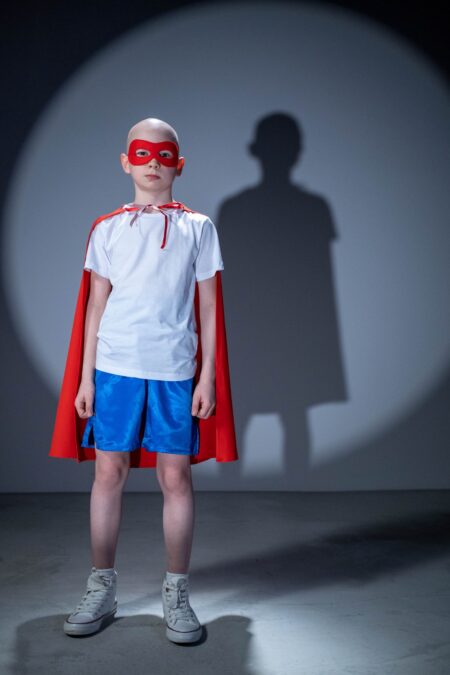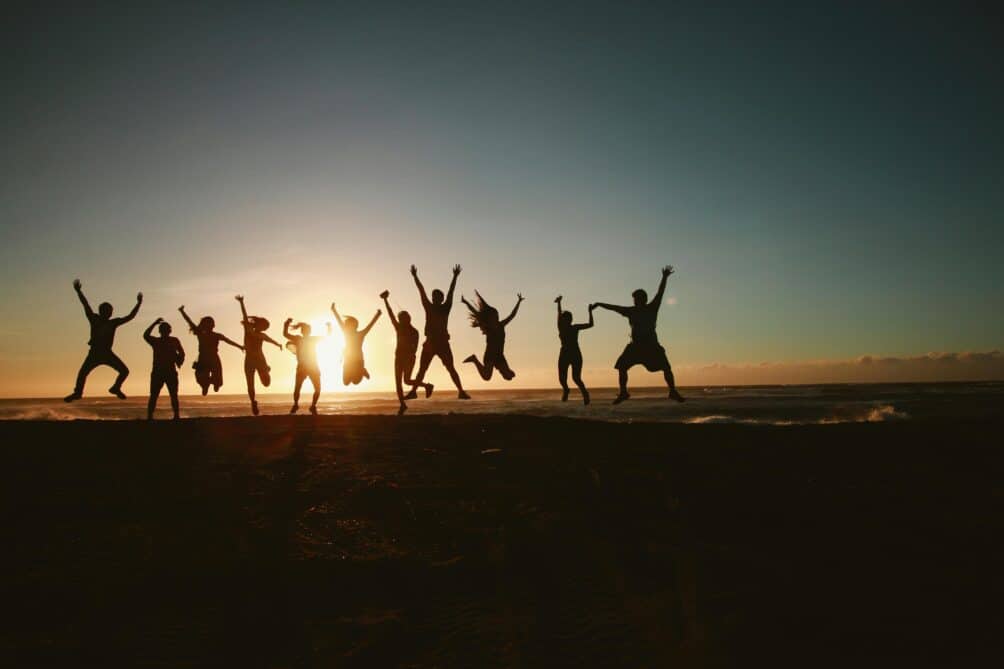I heard the crack as my collarbone gave way. Surely this should not happen to a superhero. Where had I gone wrong?
Scroll back 30 seconds.
Do you ever dream of being a Superhero?
My cape billowed behind me. This was mainly because my Superman suit was too big and there was a draft in the hall. But the steely look on my face, that was 100% genuine.
The family was watching television, but not me. I laughed at their weakness. Mortals! They would watch greatness on the screen, but I would achieve greatness, right here in the hallway of our home.
This was no time for sitting around, I had committed myself to the rigours of disciplined training. I knew that if I was going to make an impact on the world – especially aged 6 – I needed to stand out. But I had to admit, learning to fly was hard.
I had a method. In the hall was a big antique chair with strong arms and a soft leather seat. From the arms I could launch myself to the stairs. Then I could turn on the stairs and leap back to the safety of the leather cushion. All I needed to do was inch the chair further away from the stairs after each successful flight. At some point, surely, I would be released from the habit of falling to earth.
Back and forth I went, time and again. My confidence rose. I felt the superpowers burgeoning within me; indisputably all they needed was some great need, a challenge, a crisis for them to burst forth.
Cometh the hour, cometh the man?
I moved the chair a whole foot away from the stairs and mounted the launch platform once again. I surveyed the distant stairs in my steely gaze and set my sights upon the third step. My expression hardened, mouth set, and teeth clenched. My muscles bunched in anticipation as I crouched and, with an incredible force, leapt into the void.
I felt the blood (or was that superpower?) rushing through my veins as I flew, body outstretched. I could feel the air rushing past my cheek; had I reached escape velocity?
The horizon started to fall away. My speed was ebbing. The steps seemed so distant. My confident gaze was replaced by wide-eyed panic. My lofty dreams were about to crash into the unforgiving floor of reality.
Above the sound of the television there was a large thump followed by a high-pitched yowl. The rest of the family burst through the door and into the hall to gape at the terrible sight of the fallen hero. There I lay; a diminutive blue and red heap at the base of the stairs, one arm held at an unexpected angle.
Hot tears of frustration and humiliation burnt my (noble) cheeks. To maintain my dignity and protect my battered pride I removed my hero cape for the journey to hospital.
Great Man Theory
Why did I so badly want to be a superhero? Given the deluge of superhero movies it seems I am not alone in this desire.
It seems that deep down we have a yearning for power. A desire for the power to save. We also seem to want a hero to follow; someone we can respect so much we would be happy if they saved us.
This concept echoes through popular culture but is nothing new. One of the earliest official leadership theories is the ‘Great Man’ theory, as described by Thomas Carlyle. According to the hypothesis, The Great Man appears at a key moment of history to lead. Such men rise so far above ordinary people they are effectively worshipped.
“The Great Man was always as lightning out of Heaven; the rest of men waited for him like fuel, and then they too would flame.”
Thomas Carlyle
Many of us dream of being heroes but very few of us can relate to this very narrow view of leadership as it excludes pretty much everyone. For starters is completely discounts great women and assumes people are born to greatness and leadership.
This theory leaves us with examples such as Alexander the Great, Julius Caesar or Napoleon. These are leaders who had great power and influenced history but whose methods and legacy are often highly divisive.
I have certainly never considered myself anything close to being a ‘Great Man’ and don’t feel like I was a born leader. Not only do I not have superpowers, I am also an introvert by nature, which is contrary to the traditional popular picture of a leader.
What can we learn from the Great Man model of leadership?
Carlyle was a historian trying to suggest a grand narrative of history. He was not a leadership guru but someone who viewed events through the biography of powerful men. Studying the larger-than-life figures of history, warts and all, can help us grow as leaders.
The negative illustrations of history are perhaps the most instructive. Hitler, Stalin and other despots believed they were in the mould of the ‘Great Man’, but power is not greatness. If there is one thing we have learned from superhero culture, is it that:
“With great power comes great responsibility.”
Stan Lee
God bless Stan Lee.
What makes us great?
Responsibility is using our influence for good, and good decisions are dependent upon good values.
Moral ambiguity, particularly at the beginning of the twentieth century, allowed a lot of interpretation of ‘greatness’. This ambiguity can be traced back to philosophical trends of thinkers such as Nietzsche, an incredible thinker, but one who emphasised the power of the ‘great man’ as one unbound to any external code of ethics. (Hassan 2016). Nietzsche put it this way:
“You have your way. I have my way. As for the right way, the correct way, and the only way, it does not exist.”
Friedrich Wilhelm Nietzsche
And thus, the post-modern world was born.
The journey to greatness?
You would have thought that the busted collarbone would have taught me the foolishness of trying to be a superhero. In the short term it just changed my superhero aspirations from Superman to Batman. Since then, I have tallied up another snapped collarbone, a cracked arm, a couple of fractured ribs, several broken fingers and a leg in plaster.
I was not born to greatness and most of the time I do not feel like anything special. I take comfort in the words of Confucius:
“Our greatest glory is not in never falling, but in rising every time we fall.”
Confucius
So even if you don’t feel like the superhero, the great man or the leader, don’t give up. Being a leader, being a great person, is less about power than it is about taking responsibility and having a growth mindset.
That is how we fly above the lesser version of ourselves.
If you enjoyed this and would like access to some bonus content and get updates then please do sign up to my email list.
References
Carlyle, Thomas (1840) On Heroes, Hero Worship, and the Heroic in History,
Hassan, Patrick (2016) Nietzsche on Human Greatness, https://link.springer.com/article/10.1007/s10790-016-9570-9
Lee, Stan (2002) The Amazing Spider-Man, Vol. 2 #38, New York: Marvel Worldwide Inc.
Nietzsche, Friedrich Wilhelm (1885) Thus Spake Zarathustra,



